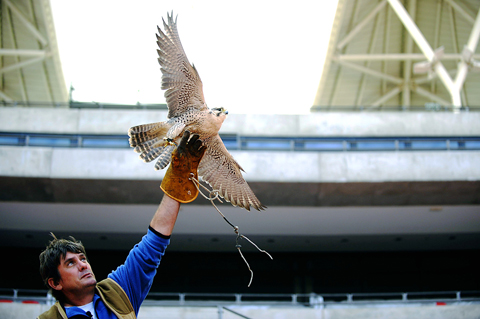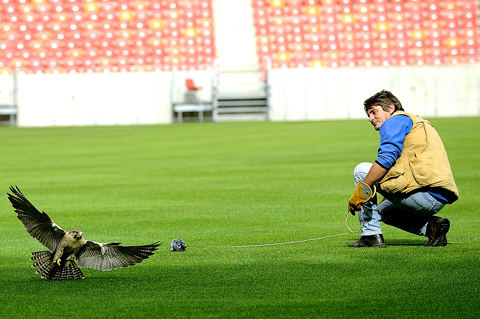A South African World Cup stadium has turned to birds of prey to chase out rogue pigeons and rats in an anti-pest strategy that favors raptors above the pitch instead of poisons.
The new 46,000-seat stadium in coastal Port Elizabeth sports several bird and bat boxes under the outer eaves of its striking petal-shaped roof to draw aerial hunters.
“We’ve gone completely poison free. This is the only stadium with a program like this in place as a pest deterrent,” stadium manager Rob Hichens said.

PHOTO: AFP
The strategy was designed as a harmonious system — the wild raptors hunt and chase away feral pigeons, eliminating the notoriously slovenly birds’ nests and droppings which attract rats.
“Pigeons are extremely messy. The whole of town is riddled with them. I did a feral pigeon count in town and we’ve got over 10,000 birds,” said Arnold Slabbert of the Urban Raptor Project, who drew up the pest strategy.
The birds carry lice and diseases in their feces which damage the seats, while rats eat the droppings and raid the nests for eggs and chicks, he said.

PHOTO: AFP
“Immediately, you are allowing a big pigeon problem to develop, you are causing a rat problem to start as well. You don’t want pigeons in a stadium, end of story,” he said.
The raptors can be seen soaring above the 2 billion rand (US$264 million) stadium, which overlooks a lake near the city’s central business district, while wagtails are spotted feeding off insects on the pitch.
“At the moment, three African peregrine falcons live in the stadium. They hunt quite extensively,” he said. “They’re extremely effective at controlling the pigeon population. The pigeons don’t come near the stadium, they just stay away. It’s an amazing deterrent.”
Bat boxes were also erected in trees and under the outer stadium roof for indigenous bats — which can eat 132 mosquitos an hour — drawn by insects attracted by the stadium’s lights and its lake setting.
Plans are also afoot to introduce indigenous grass-eating rats in the surrounding marshy areas to provide food for hunting rock kestrels to draw them to the stadium, which has no rat problem, Slabbert said.
“I look at an integrated control of all pest species. I’m creating a complete little ecosystem here,” he said.
A hand-reared larger falcon is brought in to chase away crows, which pick on electrical wires and whose roosts can number about 100 birds. A would-be red wing starling residence has also been chased out of the stadium.
Slabbert was approached to identify potential bird problems during the three years it took to build the stadium and he has set up similar projects in the area.
“It’s the only World Cup stadium that does this and it’s the only World Cup stadium that definitely doesn’t have a bird problem,” Slabbert said.

Taiwan’s participation in the Olympic Games has been a story of politics as much as sports, with the name it has competed under since 1984 — Chinese Taipei — drawing as much attention as its athletes. However, with the Games of the XXXIII Olympiad set to begin in Paris on Friday, the exploits of Taiwan’s athletes past and present who have won 36 medals since the country’s debut in Melbourne in 1956 deserve a nod. Many of Taiwan’s medal winners have gained considerable name recognition, but only two have achieved legendary status — Maysang Kalimud and Chi Cheng, the only medal winners

Shohei Ohtani on Sunday hit a 473-foot (144m) home run as the Los Angeles Dodgers went deep six times in a 9-6 victory over the Boston Red Sox. Freddie Freeman, Teoscar Hernandez, Gavin Lux, Austin Barnes and Jason Heyward also connected as Los Angeles swept the three-game series. “Going into the break, we weren’t playing good baseball, and then to come out fresh against a really good ball club and to play the way we did — the offense came to life,” Los Angeles manager Dave Roberts said. It was the 25th time the Dodgers launched at least six homers in a game

Canada women’s soccer coach Bev Priestman on Wednesday said she would step away from the team’s opening game against New Zealand at the Paris Olympics in the wake of a drone scandal. New Zealand complained to the International Olympic Committee’s integrity unit after it said drones were flown over closed practice sessions earlier in the week. As of press time last night, Canada, the defending Olympic champions, were set to open the Paris Games against New Zealand in Saint-Etienne. In the fallout of the complaint, two staff members — assistant coach Jasmine Mander and analyst Joseph Lombardi — were sent home, the

Conventional wisdom dictates that the average retirement age for elite female players in the intense and physically demanding sport of badminton is well under 30 years old. Five female shuttlers are set to turn that on its head when they make their fourth Olympic appearances at the Paris Games, a feat never accomplished before. Taiwan’s Tai Tzu-ying, 30, Thailand’s Ratchanok Intanon, 29, Belgium’s Lianne Tan, 33, and Hong Kong’s Tse Ying Suet and Canada’s Michelle Li, both 32, are to compete for Olympic glory at Porte de La Chapelle Arena from Saturday to Aug. 5. “These achievements get missed because they’re women,” said